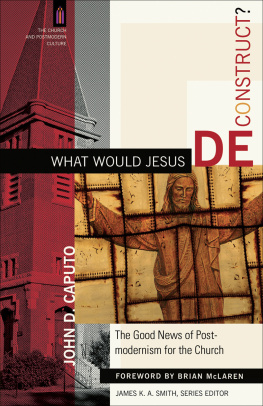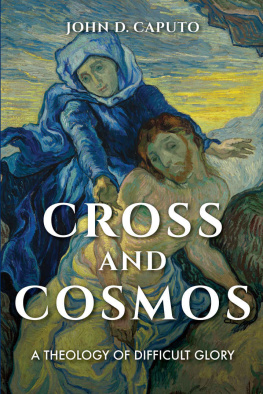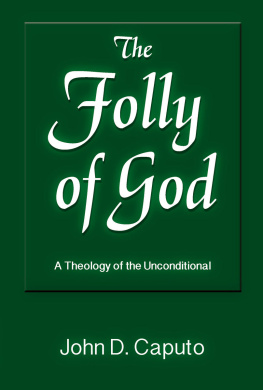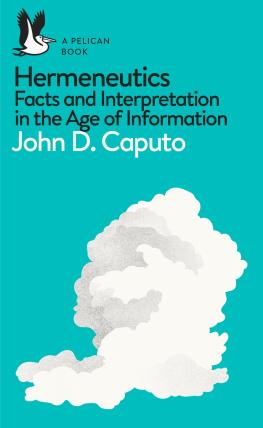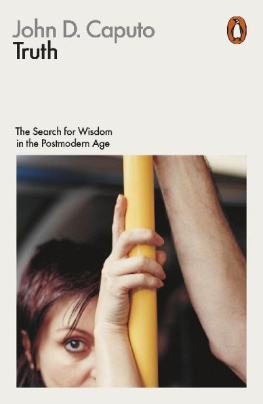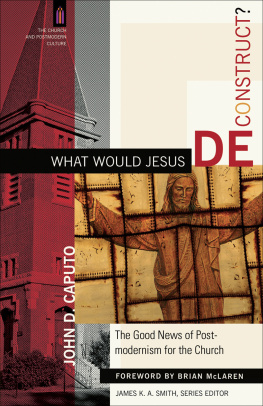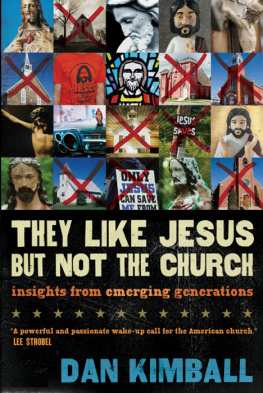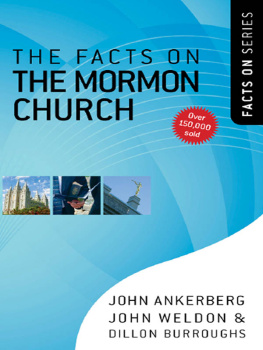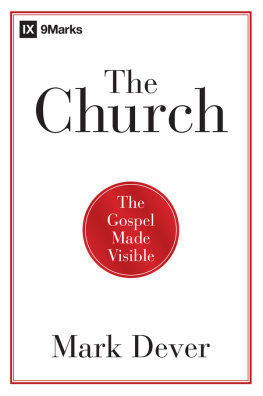My thanks to Sharon Baker (Messiah College), B. Keith Putt (Samford University) and Elizabeth Morgan (Eastern University), who have read this manuscript for me and have been a constant source of good advice. My special thanks to Jamie Smith and Robert Hosack for having invited me to contribute to this book series and to Jamie in particular for his encouragement throughout and for an extremely thorough reading of the manuscript at a critical point in its composition. The whole idea may be blamed on Brian McLaren whose invitation to speak at an Emergent Youth Specialties Convention in 2004 resulted in a presentation entitled Why the Church Deserves Deconstruction, which spawned the present work. A few pages of this book, indicated in the endnotes, are excerpted from Theopoetic/Theopolitic (with Catherine Keller), Cross-Currents 56, no. 4 (Winter 2007): 10511, and Beyond Sovereignty: Many Nations under the Weakness of God, Soundings: An Interdisciplinary Journal 89, nos. 12 (Spring-Summer 2006): 2135.
In 1896, Charles Sheldon, a pastor in Topeka, Kansas, wrote a book titled In His Steps. What gives me the courage to go on is that in both Jesus and deconstruction forgiveness enjoys pride of place and that the most perfect form of forgiveness is to forgive unforgivable offenses, like the one I here propose to commit. I pin everything on the hope that we have all done something we are ashamed of and no one will have the courage to cast the first stone.
What Would Jesus Do?
Sheldon hit on the idea of holding his congregations attention by way of a series of weekly sermons that would in fact be a serialized novel, with cliff-hanger endings each week that would draw the congregation back on the following Sunday, an idea that the creators of TV series like 24 have since seized on with great success. In the opening chapterit was published a year later as a booka homeless man, in his early thirties (the traditional age of Jesus at his death), disturbs the decorum of the Sunday morning services of the First Church of Raymond, the most proper and prosperous church in town. Were I to produce a film version of the book I would look for someone like the Henry Fonda of Grapesof Wrath to play this character, someone soft spoken but whose words rise up from the depths. The choir has given a particularly excellent rendition of Jesus, I my cross have taken, All to leave and follow Thee. The pastor, Rev. Henry Maxwell, has just concluded a stirring sermon on 1 Peter 2:21: For hereunto were ye called; because Christ also suffered for you, leaving you an example that ye should follow his steps (I have retained language of the King James Version used in the novel for a reason). Then, at just that precise moment, the bedraggled young man comes forward and addresses a startled congregation:
Im not an ordinary tramp, though I dont know of any teaching of Jesus that makes one kind of a tramp less worth saving than another. Do you? He put the question as naturally as if the whole congregation had been a small Bible class. He paused just a moment and coughed painfully. Then he went on. (In HisSteps, 8)
He recounts a Dickensesque story of misfortune. He has lost his job as a typesetter, his wife died in a desperate New York City tenement (owned by Christians), and he can no longer care for his daughter, who now lives with a friend. After reporting his futile attempts to find help in their community despite three days of trying, he concludes:
It seems to me theres an awful lot of trouble in the world that somehow wouldnt exist if all the people who sing such songs went and lived them out. I suppose I dont understand. But what would Jesus do? (In His Steps, 10)
Then he gives a queer lurch and falls in a heap on the church floor. A doctor rushes to his side and reports, He seems to have a heart problem. That is as close to a double entendre as you will find in Sheldon, for whatever physical ailments the mans poverty has caused, he certainly has a broken heart! Is he dead or alive? Will he recover? The picture fades. Come back next week if you want to find out.
The following Sunday the faithful in Topeka packed the church to learn that the man had later died in the home of Rev. Maxwell. That proves to be a week of fateful soul searching for the pastor, who finds himself face-to-face with the mans dying words, which he in turn puts to Raymonds best: Are you ready to take the pledge? To do what Jesus would do? A shudder is sent through the powers that be in townthe local college president; the editor of the town newspaper; the superintendent of railroads; and one Virginia Page, an heiress who had just inherited a million dollars, a statuesque blonde of attractive proportions, which is evidently how such matters were put in 1896 Topeka (we have since come up with other language). The novel goes on to tell the story of the transformation that takes place in the lives of everyone.
Thus was born the question What would Jesus do? Because Sheldon failed to secure a proper copyright, the book was allowed to gain a wide circulation. Sheldon distributed what royalties he did receive among his numerous charitable causes. In His Steps is not going to make it on most Great Books lists. It is sentimental and a bit simplistic; it is preachy and a bit pietistic; its characters are thinly disguised props for ideas; and the King James version of the Bible it uses is a good fit for its stilted and theatrical style. Still, it would be excessively snooty for an academic like myself to dwell on its literary limitations, which is basically to congratulate myself for not having written a book that has sold 30 million copies. The book has a certain charm and a few dramatic twists that probably passed for cliff-hangers in Kansas, and it has managed to communicate something of permanent and central importance about the gospel, about its prophetic message of generosity toward the most dispossessed and disadvantaged, and about the serious social obligations of Christians. It got this message out to large numbers of Christians, well beyond the numbers reached by much weightier tomes of theology or scholarly articles in the Journal ofthe American Academy of Religion.
I commend the reading of this book to Christians, left, right, and center, not all of whom may realize today where this famous question comes from. It will be an eye opener to the Christian Right, who, having tried to blackmail us with this question, will discover that the slogan they have been wearing on their T-shirts and pasting on their automobile bumpers all these years is a call for radical social justice! That may precipitate a spate of garage sales all over suburban Christendom, where well-scrubbed Bible thumpers will seek to rid themselves of such subversive paraphernalia or, at the very least, to keep them away from the children. (The Left, by contrast, would stand to pick up some bargains were it not so terrified of religion.) So even if, as I concede, Charles Sheldon is no Charles Dickensor Reinhold Niebuhr or Dietrich Bonhoeffer, for that matterhe is the author of a question that has captured the minds and hearts of millions of Americans today, and he is worth another look.
Trained at Phillips Academy, Brown University, and Andover Theological Seminary, Sheldon was a formative influence on the Social Gospel movement, and he put the gospel personally into practice. He spent periods of time living among the poor and working class of Topeka, including time in Tennesseetown (the Rectangle in Raymond)a large black ghetto not far from his churchto which he dedicated considerable attention. He was a critic of racism in the church and of the Ku Klux Klan in particular, and he advocated equality for women in the churchthey figure prominently in In His Stepsand in society at large.
Sheldon called for personal transformation and personal responsibility, which was his evangelical side, but at the same time he was attentive to the larger issue of the need for social and structural transformation, which was his Christian-socialist side. His focus on alcoholism is typical. He thought alcoholism was in part a matter of character and willpower, which is certainly true, but he also understood that it was a social problem and very much a function of systemic poverty and unbridled capitalism. As the statuesque Virginia Page says, The saloon furnishes material to be saved faster than the settlement or residence or rescue mission work can save it (
Next page
